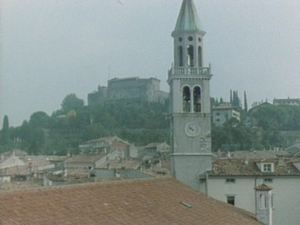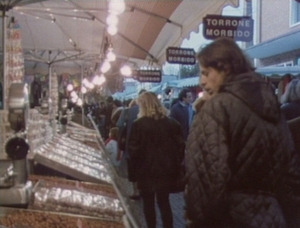The Fair of Belonging
Directed by: Danijel Jarc
Screenplay and Direction: Danijel Jarc
Assistant Director: Igor Devetak
Cinematography: Janez Kališnik
Sound Recording: Frane Povirk
Editing: Ana Zupančič
Music: Ilija Šurev
Production Representatives: Igor Prinčič, Milan Blažin
Cast: Orjana Velikonja, Alenka Kranjc
Voice: Mariagrazia Plos, Alenka Vidrih, Riccardo Canali, Adriano Giraldi
Responsible Editor of Cultural Program, TV Slovenia: Jaroslav Skrušny
Graphics: Marko Samec
Film Processing: Film Laboratory TV Slovenia
Dialogue Recording: Studio Zanin, Gradisca d'Isonzo
Sound Design: Igor Laloš
Assistant Sound Editing: Peter Potočnik
Production: Kinoatelje, TV Slovenia Ljubljana
Year: 1992
Duration: 54 min
Format: 4:3
Contributors to the Film's Creation:
Slovenska kulturno-gospodarska zveza, Gorizia; HIT, Nova Gorica; Kulturni dom, Gorizia
The film was made with support from the Ministry of Culture of the Republic of Slovenia.
Thanks to: Marko Sosič, Francesco Macedonio, Andrej Mlakar, Jože Babič, Boris Peric, Sandro Rossi, Giorgio Zichichi, Kinoatelje, and everyone who contributed to the film's creation.
Synopsis
This medium-length film presents the city of Gorica, which plays the leading role in the story. Gorica is portrayed in multiple ways, through Lidija's narration, her research for a tourist guide, and through her memories of her friend Urška from Nova Gorica. Urška's memory serves as a pretext for Lidija to reflect on her own Gorica, the city's past, the border, and belonging.
Belonging is the invisible thread that runs through much of the film. Urška followed Stanko because she “belongs” to him. Stanko went to the Croatian front because he felt a connection to his people, and Lidija stayed because she belongs to Gorica. The story unfolds during the St. Andrew's Fair, a traditional event that represents both social interaction and commerce, symbolizing Gorica's dual identity. On one hand, the festive atmosphere of the fair symbolizes the leisurely, peaceful life of the city. On the other, there is an undercurrent of tension as Lidija contemplates the world war, the border as its tragic consequence, and the human instinct for belonging, which some people use to disguise their true motivations. The city's landmarks march toward Gorica, symbolizing the encroaching impact of the border.
In Lidija's mind, the concepts of border and belonging intertwine. For her, Gorica and Nova Gorica are one unified city, a single concept in her heart.





